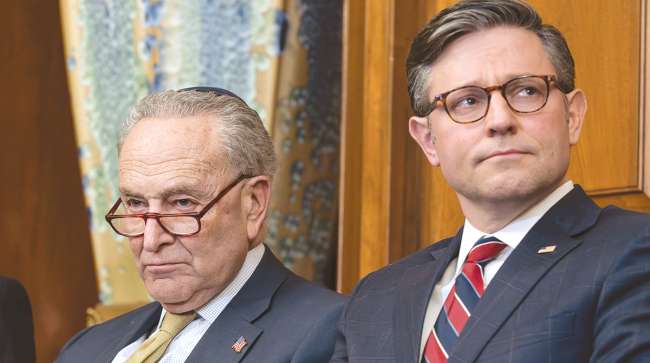Senior Reporter
Congress Faces Deadline on Partial Government Funding

[Stay on top of transportation news: Get TTNews in your inbox.]
Members of Congress returned to Washington this month to face a Jan. 19 partial government funding deadline.
Lawmakers must decide whether to keep agencies open or shut down operations.
Congressional leaders are hoping the choice before members is an easy one. Both Senate Leader Chuck Schumer (D-N.Y.) and Speaker Mike Johnson (R-La.) are seeking support from colleagues on fiscal 2024 measures meant to keep government operations uninterrupted.
Funding authority for the U.S. Department of Transportation and other nondefense agencies expires Jan. 19. For the rest of the government, funding expires Feb. 2.
I just took the first step on the Senate floor to pass a temporary extension of government funding so that the government does not begin to shut down on 1/19 and put at risk programs millions rely on. This will allow us to continue working to finish the appropriations process. — Chuck Schumer (@SenSchumer) January 11, 2024
The leaders are expressing a sense of urgency. Schumer said he will soon unveil a legislative proposal designed to guarantee short-term funding for federal agencies. The Senate leader stopped short of detailing the length of his temporary funding stopgap bill.
“The most immediate need on the calendar is avoiding a government shutdown and fully funding the government for fiscal year 2024. A shutdown is looming over us starting on Jan. 19 — about a week away,” Schumer explained on the floor of the Senate on Jan. 11. Further in his remarks before the chamber, Schumer added, “Unfortunately, it has become crystal clear that it will take more than a week to finish the appropriations process.”
Republicans in the chamber, led by Sen. Mitch McConnell (R-Ky.), signaled their support for a short-term continuing funding resolution. “We need to prevent a government shutdown. And so the obvious question is how long does the [continuing resolution] need to be. And that’ll be up to the majority leader and the speaker to determine the length of the CR,” McConnell told reporters on Capitol Hill Jan. 9. “The Senate — the simplest things take a week in the Senate. So I think frequently the House doesn’t understand how long it takes to get something through the Senate.”
I’m encouraged that the Speaker and Democratic Leaders have identified a path toward completing FY 2024 appropriations. America faces serious national security challenges, and Congress must act quickly to deliver the full-year resources this moment requires. — Leader McConnell (@LeaderMcConnell) January 7, 2024
On the House side, Johnson sounded hopeful about the lower chamber’s prospects of advancing funding legislation ahead of the first of two funding deadlines. Speaking with reporters in Congress on Jan. 10, Johnson explained, “I would say the pedal is to the metal right now. And I am very hopeful and optimistic that we can meet the deadlines. As you know Jan. 19 is coming up; Feb. 2. They’re in two different tranches.”
“We’re not going to pre-judge that,” the speaker went on, “but I’m telling you that I know the staff is working overtime as the members have been, as the leadership team has been all throughout the holidays to get this done for the people.”
Senior Democrats in the House continue to call on the Republican majority to advance fiscal 2024 funding legislation. Government operations are functioning through short-term stretches set at current funding levels.
“After months of Republican delays, it is now time for the Appropriations Committees to write final funding bills,” Rep. Rosa DeLauro (D-Conn.), Appropriations Committee ranking member, said Jan. 7. “House Republicans wasted the entire first extension of federal funding, and most of the second, arguing over 2024 funding levels they agreed to last June.”
Want more news? Listen to today's daily briefing above or go here for more info
Last year, the Senate advanced its fiscal 2024 transportation appropriations bill. The legislation would provide $98.9 billion for the departments of Transportation and Housing and Urban Development. For transportation agencies, the bill would dedicate $20.2 billion for the Federal Aviation Administration, $16.8 billion for the Federal Transit Administration and $3.4 billion for the Federal Railroad Administration.
House Republicans have been unable to advance their version of the fiscal 2024 transportation bill. Both the Senate and House measures would provide the Federal Motor Carrier Safety Administration with nearly $1 billion.




